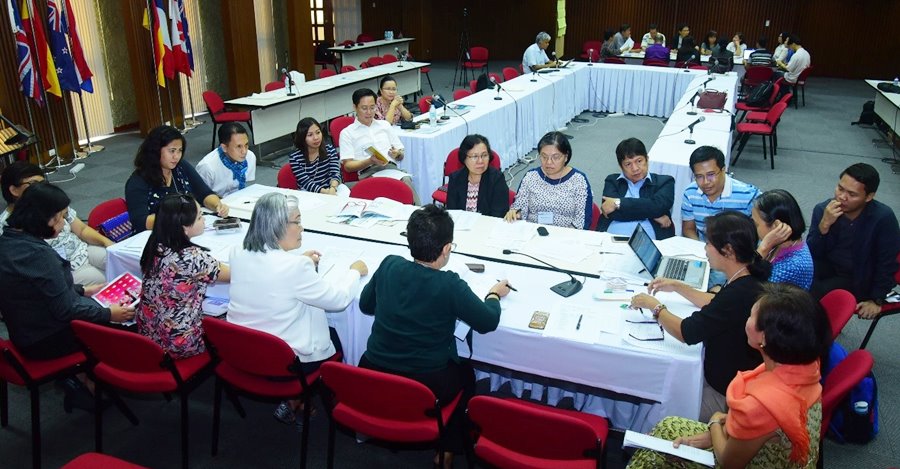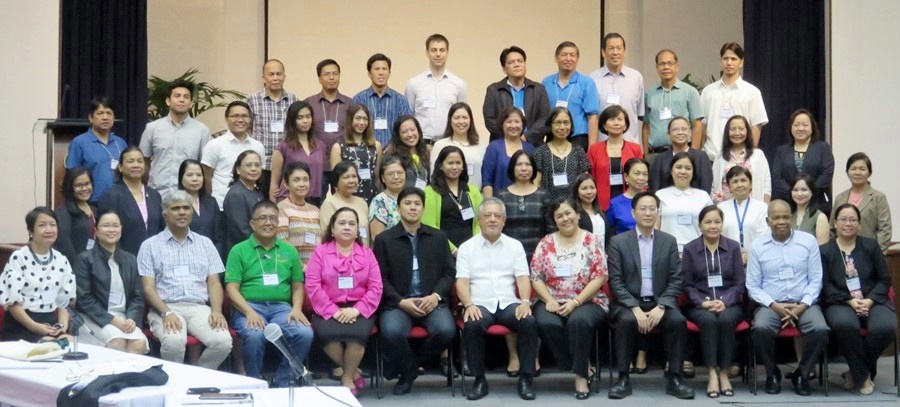Previous runs of the workshop were conducted in Cambodia, Lao PDR, Myanmar, and Vietnam, which launched the ATMI-ASEAN Project in these countries. At the end of the workshop, participants were expected to (1) gain good understanding of structural transformation and market integration as these relate to agricultural growth and food security in the Philippines; (2) level-off on what the project hopes to achieve and on the roles of various stakeholders; (3) identify promising commodities for regional and global value chains; and (4) develop a Country Action Plan towards the achievement of Project target outcome, i.e., enhanced capacity of ASEAN member states to identify and design national strategies, policies, programs, and national agri-food value chain investment initiatives that benefit small-scale rural producers (SSRPs).
During the two-day inception workshop for the Philippines, 48 representatives from various government institutions and their attached agencies, local and national development agencies, non-government organizations, farmers' organizations, the academe, and the private sector shared their insights and helped in crafting the action plan for implementing the Project in the Philippines. Participating institutions and organizations included the DA; DTI; Board of Investments (BOI); Bureau of Fisheries and Aquatic Resources (BFAR); Philippine Rural Development Program (PRDP); Philippine Council for Agriculture and Fisheries (PCAF); National Economic and Development Authority (NEDA); Philippine Council for Agriculture, Aquatic and Natural Resources Research and Development (PCAARRD); Philippine Statistics Authority (PSA); University of the Philippines Los Baños (UPLB); International Rice Research Institute (IRRI); Philippine Compact Development Team-Millennium Challenge Corporation (CDT-MCC); Nexus Agribusiness Solutions; Asian Farmers' Association for Sustainable Rural Development (AFA); and Asian Partnership for the Development of Human Resources in Rural Asia (AsiaDHRRA).
In his welcome remarks, SEARCA Director Dr. Gil C. Saguiguit, Jr. said that the ATMI-ASEAN Project aligns well with the Center's thrust to promote regional integration and cooperation towards Inclusive and Sustainable Agricultural and Rural Development (ISARD), which is the centerpiece of SEARCA's current five-year development agenda. He added that the Project's goal is to come up with institutional and policy reforms that shall "ensure competitive participation and greater benefits for smallholder farmers in the regional agricultural and food markets."
In a video message, Dr. Fabrizio Bresciani, IFAD's regional economist for Asia and the Pacific, shared that IFAD through the Project is interested in understanding and improving the state of smallholder farming vis-à-vis the agricultural transformation and market integration set into high gear by the ongoing ASEAN integration. Meanwhile, Dr. Avinash Kishore, IFPRI-South Asia Research Fellow, discussed the objectives, components, and deliverables of the ATMI-ASEAN Project. Dr. Bessie M. Burgos, Program Head of SEARCA's Research and Development, provided an orientation on the objectives, program of activities, and expected outputs of the inception workshop.
Initial discussions during the workshop centered on contextualizing the project within the current state of agricultural transformation and market integration in the region and in the Philippines including the definitions, drivers, indicators, and key studies related to ATMI in a developing Asia; the Philippines' perspective on ATMI; agricultural trade situation in the country; agricultural value chain; and the importance of ATMI in food security and inclusiveness.
 DA Undersecretary Evelyn Laviña presented the initiatives undertaken by the Department under the current administration in improving the plight of the country's agriculture sector. These include the shift to high value crops, mechanized farming, development of a national color-coded agricultural guide map, and crafting of roadmaps and commodity value chain research, among others. A succeeding panel discussion focused on the role of the private sector and farmers' organizations in agricultural transformation and market integration.
DA Undersecretary Evelyn Laviña presented the initiatives undertaken by the Department under the current administration in improving the plight of the country's agriculture sector. These include the shift to high value crops, mechanized farming, development of a national color-coded agricultural guide map, and crafting of roadmaps and commodity value chain research, among others. A succeeding panel discussion focused on the role of the private sector and farmers' organizations in agricultural transformation and market integration.
Mr. Jimmy Williams, ATMI-ASEAN Project Support Unit Coordinator, provided a recap of the previous day's proceedings, while Dr. Kishore discussed the framework of analysis for developing a national strategic plan of action to promote the competitiveness and inclusion of SSRPs in regional agri-food markets. Dr. Isabelita Pabuayon, Dean of the College of Economics and Management, UPLB, presented the draft action plan crafted for ATMI-ASEAN Project implementation in the country. During the workshop, participants brainstormed to validate and improve on the draft action plan, especially on the areas of policy study and identification of priority commodities for value chain research. (Christian Ray Buendia)



